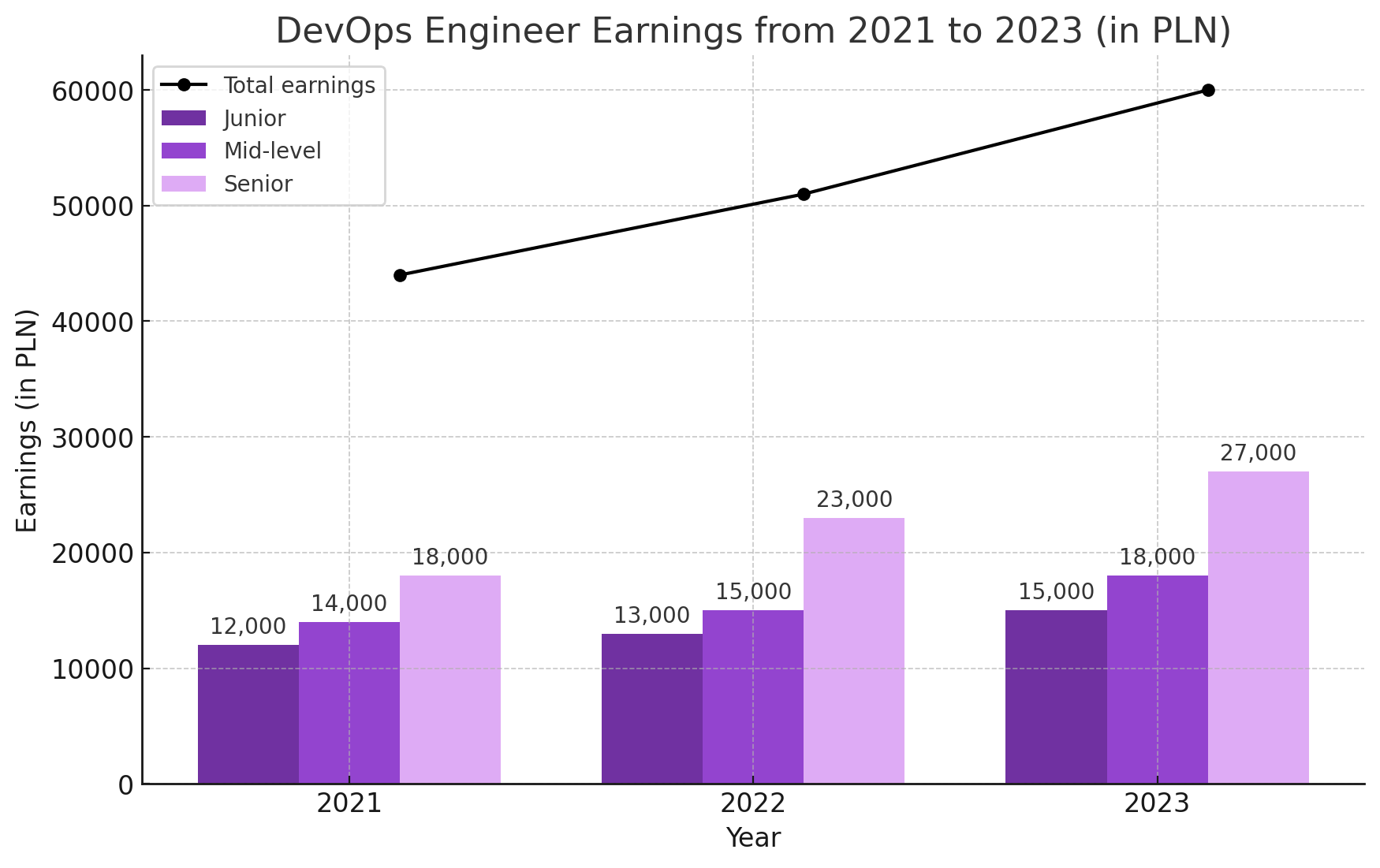Devops - what is this profession and how much you can earn?
Table of contents
In today's rapidly evolving technological world, the role of a DevOps engineer is becoming increasingly significant, blending software development and IT operations. The primary task of individuals in this field is to improve software development processes and ensure the continuity and stability of IT systems. What exactly does this position entail, and how much does it pay?
What does a DevOps do?
DevOps involves merging activities from the programming area, focusing on improving the software delivery process. It uses automation tools and practices to enhance collaboration and reliability throughout the software lifecycle. This includes tasks such as integration, delivery, infrastructure as code, and monitoring. DevOps engineers work on optimizing deployment processes, ensuring rapid and reliable software releases. They also address current issues, manage configurations, and implement best practices for performance. Moreover, DevOps is involved in integrating and managing clouds within the software delivery context.
They utilize public or private clouds for hosting applications and infrastructure, allowing resource scaling according to needs. They develop and deploy cloud strategies to ensure application flexibility and reliability, overseeing the automation of cloud resource management to optimize costs and performance while ensuring project security.
The role of a DevOps engineer in a project is crucial for ensuring the smoothness and efficiency of processes. They collaborate with both development teams, ensuring code integration continuity and test automation, and operational teams, ensuring infrastructure stability and scalability. Their actions have a direct impact on the project by reducing the time to deliver new features, increasing system reliability, and optimizing operational costs.
Daily responsibilities of a DevOps Engineer include:
- Configuring and managing automation tools and their monitoring
- Deploying and maintaining infrastructure as code
- Solving performance and security issues of applications and infrastructure
- Monitoring and responding to threats and system failures
- Maintaining continuous integration and delivery, ensuring rapid and safe deployment of changes
- Collaborating with development and operational teams to optimize processes and work tools
DevOps engineers work with a variety of technologies that support automation, infrastructure management, monitoring, and continuous integration and delivery of software. These include not only private or public clouds like AWS, Azure, or GCP but also:
- CI/CD Tools: Jenkins, GitLab CI/CD, Travis CI, CircleCI
- Terraform, Ansible, Puppet, Chef
- Docker, Kubernetes, Docker Swarm
- Monitoring and Logging: Prometheus, Grafana, ELK Stack (Elasticsearch, Logstash, Kibana), Splunk
- Code Control and Management Tools: Git, GitHub, GitLab, Bitbucket
- Testing: Selenium, JUnit, PHPUnit
- Security: Vault, AWS IAM, Azure Active Directory, Docker Content Trust
These technologies are used in various combinations depending on the project's needs. Working with these tools allows efficient infrastructure management, rapid implementation of changes, and continuous improvement of software delivery processes.
How to become a DevOps Engineer?
As a DevOps engineer, you work with a variety of technologies that support automation, infrastructure management, monitoring, and the integration and delivery of software. If you're interested in the IT industry and want to develop your career in it, and the role of a DevOps Engineer appeals to you, here are some tips for you:
- Gain solid foundations in programming, understanding of IT infrastructure, and administrative tools.
- Practice process automation, including deployment and infrastructure management.
- Gain experience in containerization, e.g., using Docker and Kubernetes.
- Familiarize yourself with cloud technologies and skillfully use cloud services for building and managing applications.
- Apply DevOps practices such as integration, delivery, monitoring, and automation.
Undertake freelance projects – this is a good opportunity to gain your first experience in the IT industry (including future DevOps engineers). Besides technical issues, communication skills and teamwork are equally important. Be flexible and open to learning new tools and methodologies as the DevOps space is constantly evolving and requires ongoing exploration of new possibilities. The DevOps area is also a culture and way of working, not just a set of tools.
Earnings

Source: Antal Salary Reports 2021,2022,2023
In 2021, the salary for a DevOps Engineer at the junior level was PLN 12,000 on average, PLN 14,000 at the mid-level, and PLN 18,000 at the senior level. In 2022, the salary for a DevOps Engineer at the junior level was PLN 13,000 on average, PLN 15,000 at the mid-level, and PLN 23,000 at the senior level. In 2023, the salary for a DevOps Engineer at the junior level was PLN 15,000 on average, PLN 18,000 at the mid-level, and PLN 27,000 at the senior level.
Employment Potential
Observing the job market, we noticed an increased interest in the role of DevOps Engineer, DevOps Consultant, or Cloud Engineer. Continuing into 2023, the role of a DevOps Engineer will still be highly sought after in the job market in 2024. Due to the growing importance of automation, integration, and infrastructure management in development processes, organizations will seek qualified DevOps specialists.
Companies from various sectors will need DevOps experts to optimize their software delivery and infrastructure processes. As early as the beginning of 2024, we observe an approximate 6% increase in interest in the role of DevOps Engineer among ongoing recruitments. In 2024, the development of cloud technologies and the continuous pursuit of IT process automation will mean that the role of a DevOps Engineer will continue to rank high among IT positions. Employing a DevOps may be particularly attractive in companies undergoing digital transformation and organizations aiming to rapidly deliver innovative solutions to the market.
In conclusion, the role of a DevOps Engineer is to integrate actions from programming and operations to streamline the software delivery processes. DevOps Engineers handle automation, infrastructure management as code, and continuous improvement of development and operational processes. The increasing importance of automation, cloud computing, and continuous integration means that the demand for DevOps specialists is high and continuously growing. In 2024, DevOps Engineers will continue to be in high demand in the job market, especially in companies undergoing digital transformation and striving to quickly deliver innovative solutions.











